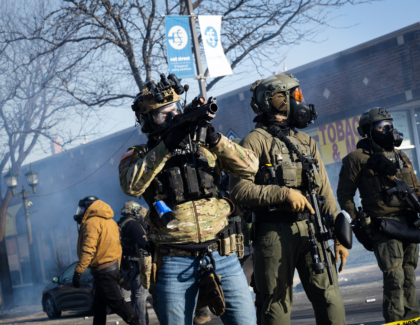Sign up for the daily CJR newsletter.
Last November, the Foreign Press Association, a nonprofit group that represents foreign correspondents working in the US, hosted a centennial gala at One World Trade Center. Guests dressed in formal attire sipped wine and champagne as a band played. Matt Murray, the editor of the Wall Street Journal, and Lally Weymouth, a senior associate editor of the Washington Post, gave speeches.
Thanos Dimadis, then executive director of the Foreign Press Foundation (the FPA branch that handles its scholarships and awards), had been working on the event for months. In January 2018, Dimadis was recruited by FPA president David Michaels to work with the organization as an independent contractor, serving under the title “executive director.” His experience as a correspondent from Greece, alongside his fundraising experience, had convinced Michaels he was the right fit.
Almost immediately, Dimadis found that his mandate had expanded dramatically. Michaels, the organization’s president, was tending to his wife, who had been diagnosed with a terminal illness and has since passed away; Ian Williams, its vice president, was recovering from open heart surgery. As a result, Dimadis was largely responsible for making sure the organization continued to function. That meant planning events such as the gala and continuing to fundraise to ensure that the association could stay solvent.
ICYMI: Why CNN should rethink sassy chyrons
Dimadis says that, in the short time that he was with the FPA, he did his job well, setting association records for amount of money raised and number of sponsorships secured. In less than a year, Dimadis raised $260,000 and received praise from the board. In reference to Dimadis’s success, Michaels wrote in his 2018 year-end message, “His direct and significant participation in much of phase one objectives contributed to the FPA exceeding expectations and targets.”
But the good vibe didn’t last. According to Williams, tensions arose between Dimadis and Michaels after Dimadis attempted to garner support from board members to replace Michaels in the presidency. In addition, Michaels says Dimadis stepped outside of the boundaries of his job, cutting outside deals with sponsors without approval from the board and president. Dimadis resigned on March 11, 2019.
According to emails that the FPA staff uncovered after Dimadis’ departure, he suggested to one of the association’s sponsors, Bayer, that the company hire him as a contractor or “consider the idea of adding an extra budget in each year’s donation so that will be part of my executional cost and will be provided upon the successful delivering of each one of our projects from me.” Bayer declined the first portion of the offer, but accepted the latter. Christopher Loder, who heads external communications at Bayer, wrote to Dimadis, “We want you to know that we will add extra budget in each year’s Bayer donation to the FPA as part of an executional cost to work on future projects. We agree that by doing this we would influence your personal role in these projects.”
Part of that influence included ensuring that awardees at the association’s gala “should not be contradictory to Bayer’s strategic communications plans and initiatives.” Dimadis doesn’t dispute the exchange, but maintains that he did nothing wrong by suggesting Bayer hire him for his additional services, and even turned over his tax returns from 2017 and 2018 to CJR to show he never directly received money from the company. (Loder did not respond to requests for comment.)
After combing through Dimadis’s emails in search of sponsor contacts to continue fundraising after his departure, current FPA staff couldn’t account for six weeks of emails missing from Dimadis’s company account. They also say that, for months, Dimadis did not grant them access to the account, resulting in the FPA entering the account via administrative access. Dimadis says he hadn’t deleted any messages or blocked anyone from the account. This back and forth led Michaels to send a cease-and-desist letter to Dimadis regarding access to the accounts; Dimadis’s lawyers responded that all materials belonging to the FPA, including login credentials, had been successfully turned over months before.
As tangled as all of this sounds, the feud didn’t end there. In his resignation letter, Dimadis said it was the continued failure of Michaels to disclose his own company expenses that was really why he left. He wrote, “There hasn’t been a disclosure of the money being used by the President, David Michaels for his expense related to meals, entertainment, and transportation during 2018 from the money that the FPA New York is raising from memberships and donations.”Dimadis also said required elections for administrative positions hadn’t taken place, and neither had an annual meeting to inform members of updates within the association. His final reason for resigning was that “the foreign press members cannot be represented [by a] board consisted of people who [make] decisions on behalf of the international press [who] are not credentialed foreign journalists.”
Dimadis was not alone in his concerns. In an email from 2017, Elaine Walsh, a professor at Hunter College, wrote in her FPA resignation email, “I have chaired and served on many nonprofit boards, but I have never experienced the lack of professionalism by a president that I encountered while serving with you on FPASF.” She added, “The Board has discussed the financial issues involving your personal expenses and the lack of clarity on how these expenses and other costs are charged to FPA.” Walsh is one of eight board members to resign from the FPA since 2017. Bruce McInnes, who is still a member of the FPA, wrote Michaels multiple letters regarding the disclosure of expenses, to which he has yet to receive a response. In one such letter, he stated, “I believe you make a professional and strategic error when you determinately decline to offer information. You do members a disservice by not relying on their professional minds to fairly interpret what is put before them. When one follows a path of nondisclosure, one runs the risk of becoming tainted by suspicion.”
After the resignation of so many board members and the suspicion raised by general members, many former FPA affiliates felt the need to establish a new organization representing the interests of foreign correspondents. In May 2019, the Association of Foreign Correspondents (AFC) was born.
Nancy Prager-Kamel is a founding member of the AFC, and is the current chairwoman of educational programs and scholarships. She was involved with the FPA for twenty-six years, during which she served as its chairwoman and worked with Dimadis, whom she and the other founding members appointed as president to AFC. She states that on multiple occasions, Michaels took “reimbursement” for personal costs, such as taxis, and that such reimbursement is not mandated in the bylaws nor ever practiced. In her FPA resignation letter, she wrote, “I need to restate most unequivocally that David’s actions and attitude with financial matters render us all in legal jeopardy. The most overriding is that he charges ‘expenses’ which he is FORBIDDEN to receive (see bylaws). It is not enough to simply present vague financials, David is using these funds personally under guise of FPA/FPF initiatives; this needs to end and funds must be returned.”
Prior to his departure, Dimadis says he and other board members requested that Michaels disclose his expenses from 2018, but Michaels declined. Michaels then hired an external law firm, Perlman and Perlman LLP, which specializes in non-profit and private foundations, to conduct an investigation of the association’s expenses, and he says, “The response from the board was to immediately engage with external professionals to investigate the allegations. They were totally unfounded and it was verified by the professionals.” The report from Perlman and Perlman LLP was sent to CJR, but has not been disseminated to the FPA’s members. Both Michaels and Perlman did note that prior to the investigation, there was no travel or expense policy, and the organization had been operating on an honor system. The FPA has since instituted an expense policy, and Perlman and Perlman LLP is now legal counsel for the FPA. The firm is responsible for sending Dimadis a cease and desist letter regarding the AFC and FPA email access.
Since its inception months ago, the AFC has received donations from corporate sponsors including Microsoft, CBS News, and P&G. It also received $50,000 from Bayer, the same sponsor Dimadis had earlier negotiated a deal with.
The feud between the two foreign-press organizations is ongoing. Both sides have lawyers involved, filing additional cease-and-desist letters and entering legal battles surrounding the use of the original name of the Association of Foreign Correspondents. Each side claims the other has falsely represented its organization as being a continuation of the original Association of Foreign Correspondents, which was founded in 1918; according to public records, neither of the organizations was actually founded that year. The FPA, whose full title is the Foreign Press Association of the United States (formerly of New York), was founded in 1993, and Dimadis states that it was misleading for the organization to have a “centennial” gala in the first place.
ICYMI: Our campaign to ban 7 words/phrases abused by journalists
Has America ever needed a media defender more than now? Help us by joining CJR today.







